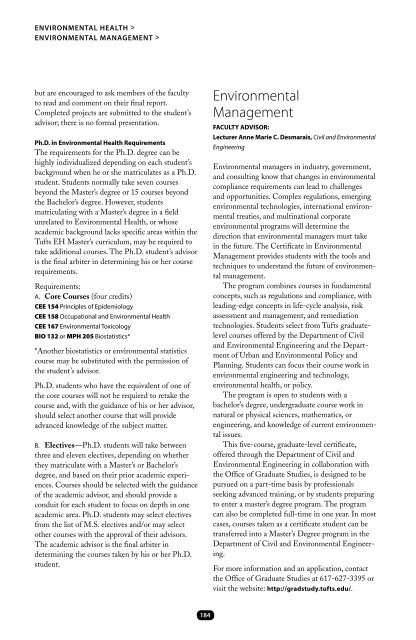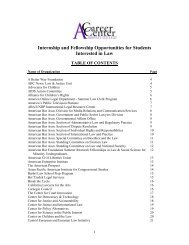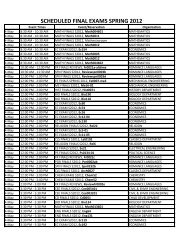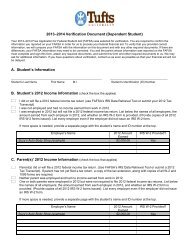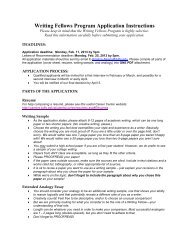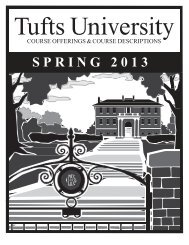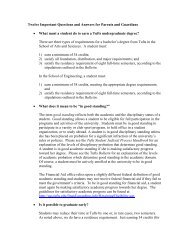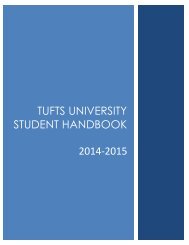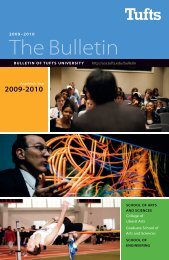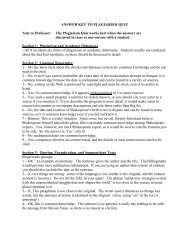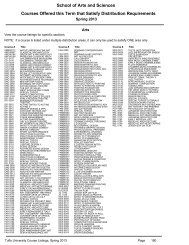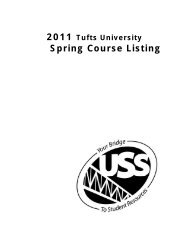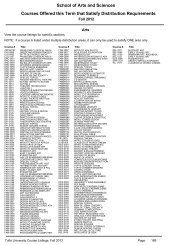2013â2014 The Bulletin - USS at Tufts - Tufts University
2013â2014 The Bulletin - USS at Tufts - Tufts University
2013â2014 The Bulletin - USS at Tufts - Tufts University
You also want an ePaper? Increase the reach of your titles
YUMPU automatically turns print PDFs into web optimized ePapers that Google loves.
Environmental Health ><br />
Environmental mAnagement ><br />
but are encouraged to ask members of the faculty<br />
to read and comment on their final report.<br />
Completed projects are submitted to the student’s<br />
advisor; there is no formal present<strong>at</strong>ion.<br />
Ph.D. in Environmental Health Requirements<br />
<strong>The</strong> requirements for the Ph.D. degree can be<br />
highly individualized depending on each student’s<br />
background when he or she m<strong>at</strong>ricul<strong>at</strong>es as a Ph.D.<br />
student. Students normally take seven courses<br />
beyond the Master’s degree or 15 courses beyond<br />
the Bachelor’s degree. However, students<br />
m<strong>at</strong>ricul<strong>at</strong>ing with a Master’s degree in a field<br />
unrel<strong>at</strong>ed to Environmental Health, or whose<br />
academic background lacks specific areas within the<br />
<strong>Tufts</strong> EH Master’s curriculum, may be required to<br />
take additional courses. <strong>The</strong> Ph.D. student’s advisor<br />
is the final arbiter in determining his or her course<br />
requirements.<br />
Requirements:<br />
A. Core Courses (four credits)<br />
CEE 154 Principles of Epidemiology<br />
CEE 158 Occup<strong>at</strong>ional and Environmental Health<br />
CEE 167 Environmental Toxicology<br />
BIO 132 or MPH 205 Biost<strong>at</strong>istics*<br />
*Another biost<strong>at</strong>istics or environmental st<strong>at</strong>istics<br />
course may be substituted with the permission of<br />
the student’s advisor.<br />
Ph.D. students who have the equivalent of one of<br />
the core courses will not be required to retake the<br />
course and, with the guidance of his or her advisor,<br />
should select another course th<strong>at</strong> will provide<br />
advanced knowledge of the subject m<strong>at</strong>ter.<br />
B. Electives—Ph.D. students will take between<br />
three and eleven electives, depending on whether<br />
they m<strong>at</strong>ricul<strong>at</strong>e with a Master’s or Bachelor’s<br />
degree, and based on their prior academic experiences.<br />
Courses should be selected with the guidance<br />
of the academic advisor, and should provide a<br />
conduit for each student to focus on depth in one<br />
academic area. Ph.D. students may select electives<br />
from the list of M.S. electives and/or may select<br />
other courses with the approval of their advisors.<br />
<strong>The</strong> academic advisor is the final arbiter in<br />
determining the courses taken by his or her Ph.D.<br />
student.<br />
Environmental<br />
Management<br />
FACULTY ADVISOR:<br />
Lecturer Anne Marie C. Desmarais, Civil and Environmental<br />
Engineering<br />
Environmental managers in industry, government,<br />
and consulting know th<strong>at</strong> changes in environmental<br />
compliance requirements can lead to challenges<br />
and opportunities. Complex regul<strong>at</strong>ions, emerging<br />
environmental technologies, intern<strong>at</strong>ional environmental<br />
tre<strong>at</strong>ies, and multin<strong>at</strong>ional corpor<strong>at</strong>e<br />
environmental programs will determine the<br />
direction th<strong>at</strong> environmental managers must take<br />
in the future. <strong>The</strong> Certific<strong>at</strong>e in Environmental<br />
Management provides students with the tools and<br />
techniques to understand the future of environmental<br />
management.<br />
<strong>The</strong> program combines courses in fundamental<br />
concepts, such as regul<strong>at</strong>ions and compliance, with<br />
leading-edge concepts in life-cycle analysis, risk<br />
assessment and management, and remedi<strong>at</strong>ion<br />
technologies. Students select from <strong>Tufts</strong> gradu<strong>at</strong>elevel<br />
courses offered by the Department of Civil<br />
and Environmental Engineering and the Department<br />
of Urban and Environmental Policy and<br />
Planning. Students can focus their course work in<br />
environmental engineering and technology,<br />
environmental health, or policy.<br />
<strong>The</strong> program is open to students with a<br />
bachelor’s degree, undergradu<strong>at</strong>e course work in<br />
n<strong>at</strong>ural or physical sciences, m<strong>at</strong>hem<strong>at</strong>ics, or<br />
engineering, and knowledge of current environmental<br />
issues.<br />
This five-course, gradu<strong>at</strong>e-level certific<strong>at</strong>e,<br />
offered through the Department of Civil and<br />
Environmental Engineering in collabor<strong>at</strong>ion with<br />
the Office of Gradu<strong>at</strong>e Studies, is designed to be<br />
pursued on a part-time basis by professionals<br />
seeking advanced training, or by students preparing<br />
to enter a master’s degree program. <strong>The</strong> program<br />
can also be completed full-time in one year. In most<br />
cases, courses taken as a certific<strong>at</strong>e student can be<br />
transferred into a Master’s Degree program in the<br />
Department of Civil and Environmental Engineering.<br />
For more inform<strong>at</strong>ion and an applic<strong>at</strong>ion, contact<br />
the Office of Gradu<strong>at</strong>e Studies <strong>at</strong> 617-627-3395 or<br />
visit the website: http://gradstudy.tufts.edu/.<br />
184


